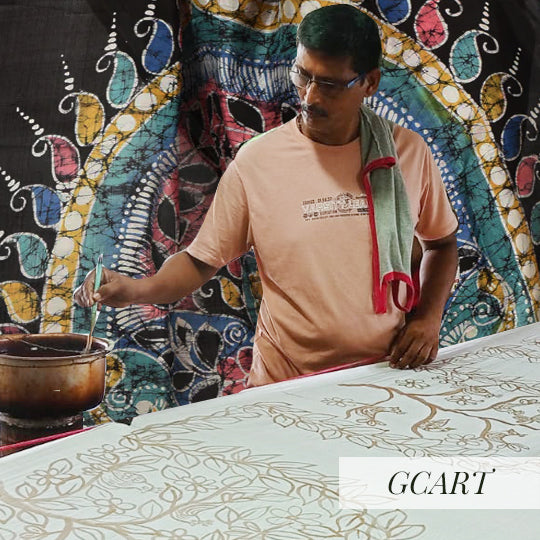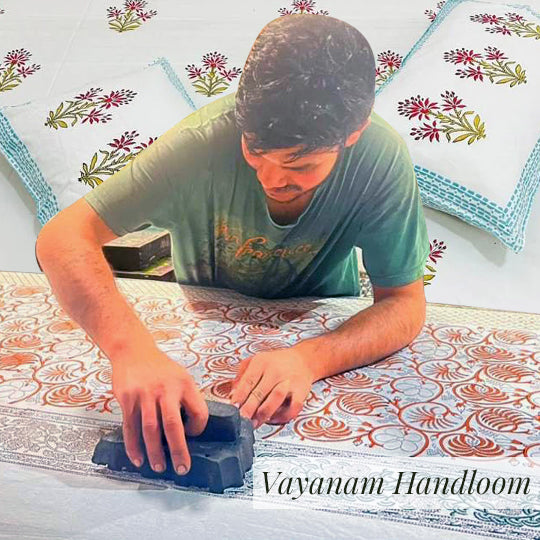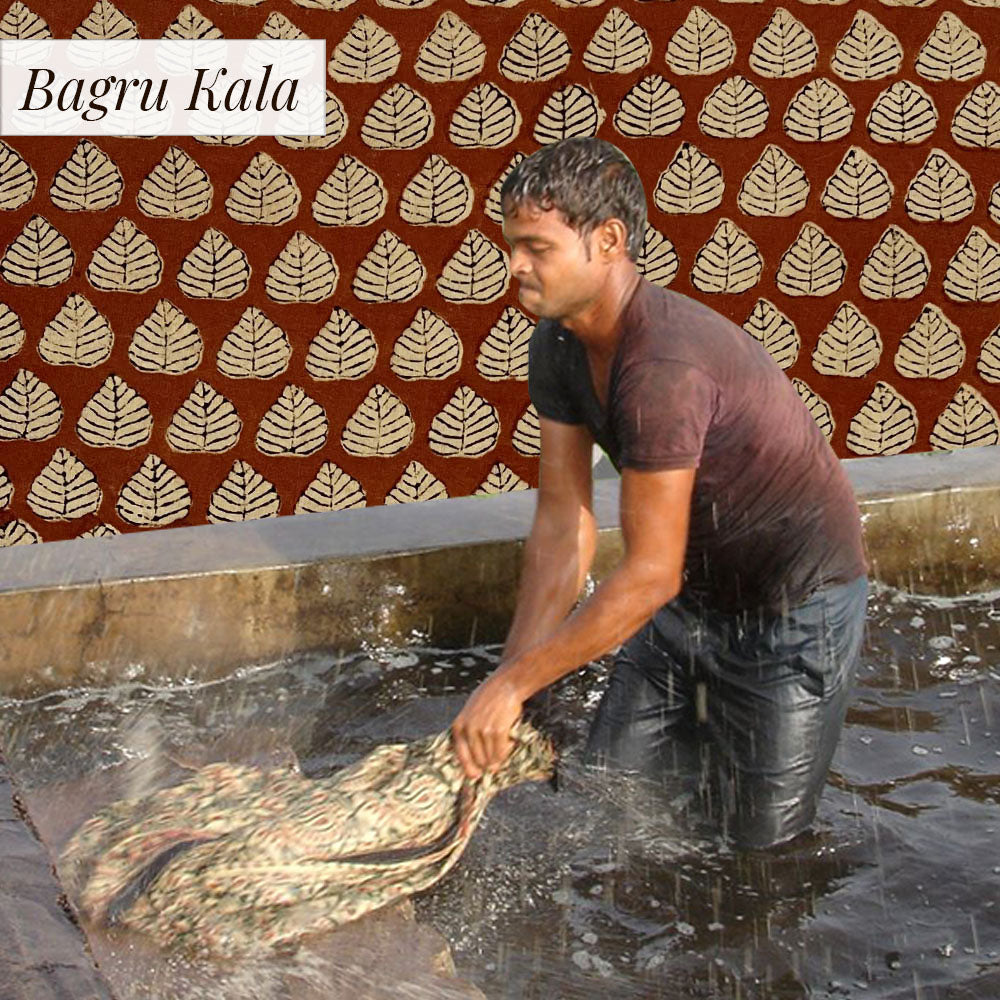GoCoop is helping weavers get better prices for their products by providing a platform on which they can sell directly to local and global buyers
GoCoop, founded by Siva Devireddy, was recently honoured by the Ministry of Textiles for its e-marketing of handloom products
On October 31, 2011, Siva Devireddy quit his job as director of Accenture’s Innovation Center in Bengaluru to embark on a path for which he had been laying the ground for over two years. The very next day he assumed charge at his entrepreneurial venture—GoCoop Solutions Private Ltd—as its CEO and managing director. The company, incorporated in October that year, owns and operates an online marketplace, gocoop.com, which gives rural handloom weavers’ cooperatives a platform to sell their products at market prices, directly to buyers across the world.
“We started operations in 2012. The marketplace was in beta [mode] since 2013 and we went fully live in August 2014,” says Devireddy, 40, whose effort has already met with success: In August 2016, GoCoop received a national award from the Ministry of Textiles for marketing of handloom products via ecommerce.
Devireddy estimates that the handloom and handicraft sector in India is about $4 billion (around Rs 27,000 crore) in size. He adds that there are about 250 million people working in about 6 lakh cooperatives of all kinds (not just handloom and handicrafts) in India, forming the backbone of the country’s rural economy. Usually, cooperatives are self-managed and self-governed groups of workers involved in a similar craft; the cooperative—with elected heads, or professional managers—helps market the products made by its members, and distributes profits equally among them.
However, weavers’ cooperatives are losing their relevance in a textile industry that is dominated by machine-made fabric; handloom products take longer to make, and are more expensive because of higher costs of labour and raw material (a large portion of which is natural, not synthetic). It is also difficult for rural cooperatives to gain access to lucrative urban and foreign markets. One of the biggest clients of handloom cooperatives are state governments, which promote these products through government emporiums. However, lack of marketing initiatives, design and technical innovation and quality improvements mean a stagnant market and prices for these goods.
Adding to these are issues related to the running of cooperatives. “Cooperatives are all not well-managed and well-run,” says Devireddy. “There are quite a few governance issues. For us, it is important to identify how good they are, and how well they are functioning. State governments usually do audits of cooperatives and we refer to these audit ratings which give a good indication on their operations.”
GoCoop works with more than 275 handloom weaver cooperatives across 10 states in India. They constitute 90 percent of GoCoop’s supplier base; the rest comprising individual weavers, other craft-based social enterprises and NGOs.
GoCoop processes around 3,000 online orders a month and clocked 100 percent year-on-year sales growth in FY15 and FY16. Nearly 70 percent of its business is B2C (business-to-consumer), which constitutes its online sales, while the remaining is B2B (business-to-business), which is an offline component. As part of its B2B segment, GoCoop connects cooperatives to institutional buyers such as garment exporters and retailers in India, as well as fair trade retailers in Europe. Depending on the requirements of the buyer—volume, quality, design and price—GoCoop puts them in touch with cooperatives that are best suited to fulfil the order. In its B2B and B2C transactions, GoCoop earns a commission of 5-15 percent on each product sold.
The largest selling product on its marketplace is handloom sarees—gocoop.com lists 5,000 sarees—which accounts for 60 percent of overall sales. The most popular among these, says Devireddy, is the Maheshwari Saree that is sourced from the town of Maheshwar, in Madhya Pradesh.

GoCoop’s work has ensured sustained livelihoods for rural weavers by protecting their skill sets and thereby preventing them from joining the unskilled labour force Image: Dinesh Krishnan
Over the last 24 months, GoCoop has raised about Rs 10 crore in early-stage funding, and is backed by investor and Infosys co-founder Kris Gopalakrishnan. Indian Angel Network, Unitus Seed Fund and Saha Fund are the other investors in the startup, which is looking to raise another round of growth capital early in 2017. Devireddy did not disclose the company’s revenues, since it is a privately-owned enterprise.
“I feel we need more initiatives [like GoCoop], which create a bridge between the artisans and the market,” says Gopalakrishnan, adding that GoCoop is a social enterprise focussed on livelihood and job creation. Devireddy recollects how he had met Gopalakrishnan only once, and then too he did not have to make a strong pitch for funding. “He said, ‘Siva, I like what you are doing, I want to support these artisans and I like the fact that you are using technology to address the problem’.”
Born in Chennai, Devireddy grew up in Hyderabad. He spent his childhood holidays in a village in Andhra Pradesh’s Guntur district, with his grandparents. These holidays made him familiar with the work and lives of people in rural India. But this was not where he learnt about handloom cooperatives. That would happen much later.
In 1998, Devireddy graduated in mechanical engineering from Osmania University in Hyderabad and got a scholarship to study for a master’s degree in industrial and management systems engineering at Arizona State University in the US. After graduating in 2000, he got a job with a startup that was part of HP Labs in California. “The startup was building a marketplace for the semiconductor industry,” recalls Devireddy. “The main objective was to connect buyers, who were mostly from North America, with suppliers of semiconductors who were mostly from Taiwan and China.”
After two years, he quit the startup and joined Accenture. In 2003, he left the US for India, but continued to work with Accenture. “Ever since then I always had this at the back of my mind: ‘How can I use a similar concept to connect producers from rural parts of India to better buyers?’” he says.
Devireddy was initially planning to build an online platform for rural producers of food products and spices. But, his research made him rethink his strategy. “I realised that the products from handloom weaver cooperatives were really good and there was no need to add more value to the product,” he says.
He laments that middlemen buy products from rural handloom cooperatives at very low rates and sell them to large institutional clients or end consumers for a much higher price, thus making it very difficult for cooperatives to make profits. For instance, the research he conducted across 20 cooperatives between 2009 and 2011, showed that for products like durries, cooperatives struggled to make profit margins of even 5-10 percent.
Seated in his Koramangala office, in Bengaluru, he points to a few sample carpets made by weavers in Warangal, Andhra Pradesh. “This is produced at Rs 45-50 per sq ft. But the same product will be shipped to New York and will retail for $10 [Rs 679] to $15 [Rs 1,018] per sq ft,” he says. Even in the domestic market, the price of handloom products is three to four times what a weaver is paid. Cooperatives and weavers do not have the wherewithal to find buyers who will pay more.
This price differential in the handloom supply chain is what really caught Devireddy’s imagination, and he claims that GoCoop has been able to address it. “In many of the cooperatives we work with, we have seen weavers earning 15 to 30 percent more than what they would normally get through their existing channels,” says Devireddy. “This directly translates into better wages for the artisans.” He adds that increase in weavers’ wages is almost proportionate to the increase in the price of the products they are making.
Moreover, as the platform scales up by including more cooperatives, products and B2B customers, Devireddy believes cooperatives could earn more than 50 percent more of what they are earning now. He also points out that gocoop.com is a transparent marketplace where prices, decided by the weavers, are based on demand and supply and include no hidden costs.
What is also helping the cooperatives get better prices for their products is the growth of their client profile—from village-level traders to export houses and retailers in Europe. Besides, unlike other ecommerce firms GoCoop does not discount products that it sells, unless the cooperatives themselves offer discounts. When compared to other online platforms selling handloom products—such as Jaypore.com and iTokri.com—GoCoop’s goal is not about hand-picking the best craft and designs from rural India and selling them online, but to enable weavers to have a better livelihood.
So how does the GoCoop platform work? Once a cooperative joins it, GoCoop helps them photograph and catalogue products, and compile product-related information and instructions online, for free. Each product is tagged and kept with the cooperatives. Once an order is placed, local GoCoop representatives go to the cooperatives, do a quality check of the product, pack it and ship it to the customer. GoCoop also has designers who help weavers innovate on patterns that might be more suitable for the widening customer base, especially for export houses and international retailers.
The payment that a client makes is kept in a bank’s escrow account; once the product is shipped, the bank is informed and the payment is debited to the cooperative within three days. To make it easier for rural cooperatives to fulfil orders, GoCoop plans to hand out 100 smartphones to them, installed with the GoCoop app, which will let cooperatives know immediately when an order is placed. However, the quality checks and shipments will continue to be handled by the GoCoop representatives.
I would like to see GoCoop’s business grow exponentially because at the end of this chain is the person to whom this matters greatly—the weavers,” says Suresh Bhagavatula, assistant professor and chairperson, Entrepreneurial Ecosystem Development, at NSRCEL, a startup incubation centre at Indian Institute of Management Bangalore. “It would mean sustained livelihoods for them and we are protecting their skill set and preventing them from joining alternative labour forces, which would only take them to the unskilled level.” Bhagavatula asserts that the main difference between established social enterprises such as a Fabindia and Mother Earth, which work with rural craftsmen, and GoCoop is that, “GoCoop is a marketplace for artisans’ cooperatives whereas they [other retail platforms] are more retail-focussed organisations. I believe the model [of GoCoop] is inventory-less and technology-driven, and quite scalable.”
Apart from brick-and-mortar stores with online platforms, ecommerce players like Amazon and Flipkart are also tapping into the handloom segment. “For Amazon and Flipkart, their purpose is to offer cheaper prices and the widest choice. At GoCoop it’s about promoting artisans, and giving buyers a choice based on that, not necessarily the lowest price,” explains Gopalakrishnan.
These, however, are not the issues Devireddy is thinking about. “How can we facilitate spinning mills to buy good cotton from farmers, and how can we facilitate handloom cooperatives to buy good cotton yarn from spinning mills,” are some of the problems he is seeking to resolve.
He also fancies launching GoCoop-branded garments. “It will probably have to be a separate legal entity,” he says, adding that GoCoop can never be eclipsed by what the brand wants to do and the brand should not be eclipsed by what GoCoop wants to do.


























Do u support other category artisans also I’m into handicrafts home decor like Torans bandanwars etc
Exceptional initiative, hope you can add more artisans across India to this platform. Good luck to all handcrafted!
GOCCOOP is helping in boosting Rural economic and local development by way of supporting Weaver’s community in India as well as strengthening cooperative movement also in India by ARASU E .Project Officer from EDII Bangalore Office
I need to know the name and contact of concerned person who organises events if gocoop all over India..
Tnx
Very happy to know about gocoop & interesting
Leave a comment